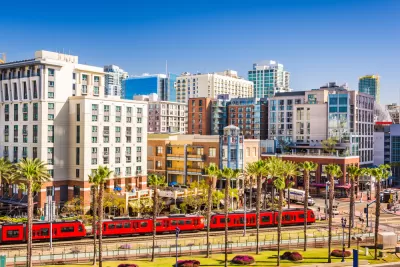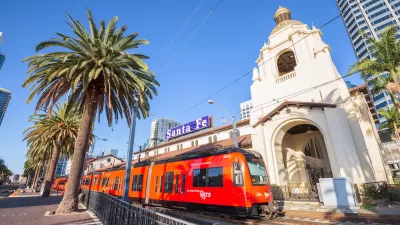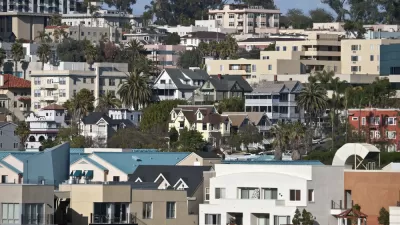Sprawl might relieve the housing crisis, but it would also exacerbate the climate crisis. Tough choices will be necessary in regions like San Diego, where the question of where to accommodate growth is very much in question.

Joshua Emerson Smith locates the intersection of the competing dynamics of dual crises, of climate and housing, in the region of San Diego:
The San Diego region is on the front lines of a statewide push to abandon suburban development in favor of building denser urban communities — a vision many California leaders have called for to curb greenhouse gases from cars and trucks.
Forcing existing neighborhoods, however, to shoulder increasingly more development is proving expensive and slow at a time when San Diego and many other regions are suffering a severe lack of affordable housing.
Some policy makers in the San Diego region want to "[widen] highways and [build] large master-planned communities far from urban job centers," according to Smith, as a response to the ongoing housing crisis in San Diego. Some 10,000 units of greenfield development on the periphery of the region are currently under consideration for approval. Local politicians around the region are pushing for projects to state routes 78 and 56 to relieve congestion and accommodate growth.
Environmental grounds like the Sierra Club are pushing back on sprawl, according to Smith, while the regional planning agency that goes by the acronym SANDAG is having trouble convincing local officials to support an urban and transit oriented vision of growth for the region. An exception can be found with San Diego Mayor Kevin Falcouner, who has spearheaded and supported a series of pro-development reforms in the city, including a law approved in March 2019 that ends parking minimums for all future developments in the city.
The article includes soundbites and opinions on the development vision of the future for the region, and proposed solutions to the housing and climate crises, from politicians and advocacy organizations on all sides of the issues.
FULL STORY: How the fight against climate change is exacerbating San Diego’s affordable housing crisis

Alabama: Trump Terminates Settlements for Black Communities Harmed By Raw Sewage
Trump deemed the landmark civil rights agreement “illegal DEI and environmental justice policy.”

Planetizen Federal Action Tracker
A weekly monitor of how Trump’s orders and actions are impacting planners and planning in America.

Why Should We Subsidize Public Transportation?
Many public transit agencies face financial stress due to rising costs, declining fare revenue, and declining subsidies. Transit advocates must provide a strong business case for increasing public transit funding.

Understanding Road Diets
An explainer from Momentum highlights the advantages of reducing vehicle lanes in favor of more bike, transit, and pedestrian infrastructure.

New California Law Regulates Warehouse Pollution
A new law tightens building and emissions regulations for large distribution warehouses to mitigate air pollution and traffic in surrounding communities.

Phoenix Announces Opening Date for Light Rail Extension
The South Central extension will connect South Phoenix to downtown and other major hubs starting on June 7.
Urban Design for Planners 1: Software Tools
This six-course series explores essential urban design concepts using open source software and equips planners with the tools they need to participate fully in the urban design process.
Planning for Universal Design
Learn the tools for implementing Universal Design in planning regulations.
Caltrans
Smith Gee Studio
Institute for Housing and Urban Development Studies (IHS)
City of Grandview
Harvard GSD Executive Education
Toledo-Lucas County Plan Commissions
Salt Lake City
NYU Wagner Graduate School of Public Service





























